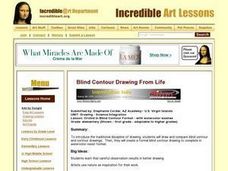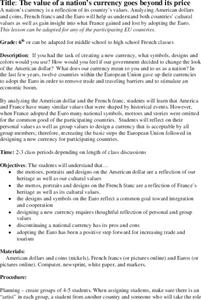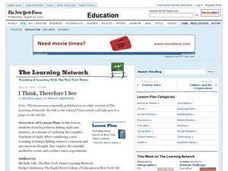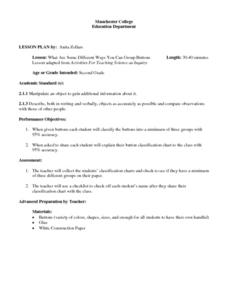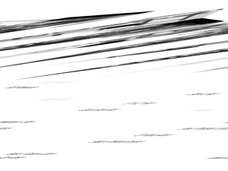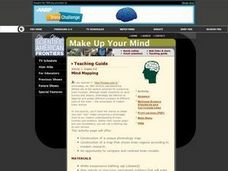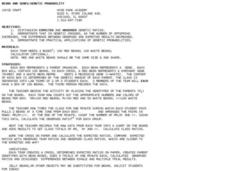Curated OER
Translating Genetic Information
High schoolers explore the process of translation. They determine the correct sequencing and present their strands to the class. In addition, they compare normal red blood cells to sickle cells and complete discussion questions.
Curated OER
Developing Environmental Awareness Through Problem Solving
Young scholars examine the relationships among living and non-living parts of the environment. Using their senses, they identify the objects in their classroom. In groups, they participate in experiments to discover where electricity...
Curated OER
Art: Weaving Based on Draft Patterns
Fourth graders observe the process of drafting a pattern on graph paper. After creating their own patterns, they create their own weavings, and explain its title to the class.
Curated OER
Panning for Gold and Magnetite
Students pan for minerals in a stream and discover why magnets attract magenitite but not nonmagnetic grains. They participate in the actual panning process and bag samples to be examined in class. Students recognize minerals by color...
Curated OER
Habitats and Adaptations
Young scholars research and describe the habitat and adaptations of a reef animal. After the student is assigned a habitat, they design and draw a cresture adapted to eat each food and to live in each habitat.
Curated OER
Miriam Schapiro Action Figures Collage
Students create a background with a marbling technique. They plan and create a figure from assorted papers, mixing solids and patterns. Students glue the figure to the background, and embellish negative space with glitter.
Curated OER
Orchid in Blind Contour Format
Students create blind contour drawings. They compare methods of drawing including blind contour and contour approaches. Students follow a blind contour method to produce a drawing of a flower and then complete the piece with a watercolor...
Curated OER
The Value of a Nation's Currency Goes Beyond Its Price
Sixth graders explore the connection between a nation's currency and its values by analyzing dollars, francs and euros. They discuss how the mottoes, designs, and portraits imprinted on currency are a reflection of heritage and cultural...
Curated OER
I Think, Therefore I See
Students participate in a memory experiment to discover how the eye works. After reading an article, they analyze a new technique which examines how the brain registers sight. They develop their own memory game and conduct trials using...
Curated OER
Sedimentary Rocks
Fourth graders discuss the basic properties of rocks, the processes
involved in the formation of soils, and the needs of plants provided by soil. They write descriptions in their Science journal and identify and discuss each type of...
Curated OER
What Are Some Different Ways You Can Group Buttons
Second graders classify and group buttons. They discuss how their buttons are alike and different, and identify the characteristics of their handful of buttons. Students then classify their buttons into three groups, and create a...
Curated OER
Fan Club for Artists
Students research a famous artist of their choice to experience their lives and achievements. They choose an artist they look up to, a hero perhaps, and share their lives with their peers to develop a banner on that artist to exhibit in...
Curated OER
Insects
Students observe and identify insects in their local. They record their observations by drawing a picture of the insect and writing a description.
Curated OER
Mind Mapping
Students explore the functions of the brain. They create their own "live" model comparing a phrenology chart to our modern understanding of brain function and anatomy. Students compare and contrast brain models.
Curated OER
Rocks and Minerals
Students are able to describe earth processes (e.g., rusting, weathering, erosion) that have affected selected physical features in students, neighborhoods. They are able to identify various earth structures (e.g., mountains, faults,...
Curated OER
Slimy Cells
Students create three-dimensional cell models. They may choose to make either a plant or animal cell but must use a Ziploc bag as the cell membrane, slime for the cytoplasm, and strawberry baskets for the cell wall if making a plant...
Curated OER
Matter for Minors
Young scholars use streaming videos, web sites, and hands on activities students to explore matter. They focus on how temperature affects matter and what the particles look like in the states of matter.
Curated OER
Animal Signs
Learners discuss the many different types of animal signs that can be used to identify and track animals. They participate in an hands-on activity in which they examine tracks, trails, homes, territory markings, and even "scat" left by...
Curated OER
Revising Paragraphs With Excessive Coordination
In this grammar worksheet, students rewrite two paragraphs using various sentence structures to make each paragraph more coherent and interesting.
Curated OER
Making Maps
In this map making worksheet, students learn about the science of making maps, which is cartography. They then answer the 11 questions on the worksheet. The answers are on the last page.
Curated OER
Pies and Percentages--Learning About Pie Graphs
In this pie graph worksheet, students draw a pie graph for the zookeeper with the data he collected, choose a different color for each animal species and make a key to the graph.
Curated OER
Synonym Surprise 1, 2, 3, 4, 5
In these five recognizing synonyms worksheets, students read short stories and use word banks to choose synonyms to replace the underlined words. Students rewrite 5 stories replacing 30 synonyms.
Curated OER
Beans and Genes/Genetic Probability
Students use 2 sets of colored beans to represent the genes of an organism. In this genetic probability lesson plan, students use the colored beans to represent the genotypes of offspring which they pull out of a box at random while the...
Curated OER
The Chemistry of Bigger Bubbles
Fourth graders explore properties of bubbles. In this lesson about bubbles, 4th graders perform an experiment. Students analyze the properties of bubble making substances and surface tension. Students create a square bubble. Students...
Other popular searches
- Shapes and Colors
- Spanish Colors and Shapes
- Adjectives Colors and Shapes
- Sorting Shapes and Colors
- Animals Colors and Shapes
- Animal Colors and Shapes
- Teaching Colors and Shapes
- Colors and Shapes Preschool
- Identfying Colors and Shapes
- Geometric Shapes and Colors
- Shapes and Color Words
- Shapes and Colors in Spanish








